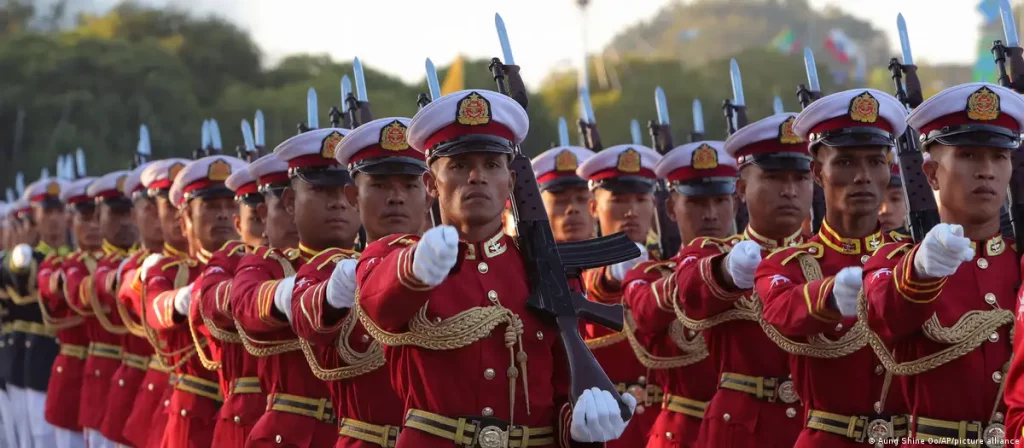Myanmar’s junta appears to be desperate and on the back foot in the face of spirited resistance by united and rejuvenated armed rebel forces fighting for greater autonomy in various parts of the country and for an end to the dictatorship of the army. Three major ethnic groups have sunk their differences and are more determined than ever before to take on the junta. The latter – mainly belonging to the majority Bamar group – has all along thrived by pitting one minority ethnic group against another through false propaganda and exploiting acrimonious relationships among different groups. The situation has come to such a pass that the army is facing an alarming shortage of foot soldiers and simmering discontent among middle and lower ranks of the force. This has compelled it to take the unprecedented course of enforcing mandatory military service for all young men and women.
According to a new fiat issued by the junta, all men aged 18-35 and women aged 18-27 must serve for up to two years, while specialists like doctors aged up to 45 must serve for three years. The service can be extended to a total of five years in the ongoing state of emergency. The junta appears to have been so scared that it has issued the notification of the effectiveness of People’s Military Service Law starting from 10 February.
Myanmar army’s brutal crackdown on the country’s pro-democracy supporters started after the military seized power from an elected government in a 2021 coup, which sparked mass protests. Initially, the junta went ahead merrily with gunning down protesters, arresting thousands of them, setting their homes ablaze and bombing through airstrikes. But, three years on, it is now met with fierce resistance from armed groups. Since October, the Tatmadaw, as the military is known, has suffered personnel losses while fighting against a well orchestrated offensive by an alliance of three ethnic minority insurgent groups coupled with allied pro-democracy fighters who have taken up arms against the junta. The success of this offensive and the military’s failure to contain it has damaged the morale among low and mid-level officers, according to experts. As it is increasingly finding it difficult to recruit regular soldiers, the junta has now begun to force non-combat personnel to go to the frontline. Its helplessness and desperation can be gauged from the audio message released by the junta’s information team which says “a national military service system involving all people is essential because of the situation happening in our country.”
A law mandating conscription was introduced in 2010 but has not been enforced until now. Those who fail to comply with the draft face imprisonment for up to five years, the legislation says. The official statement did not give further details but said the junta’s defence ministry would release necessary bylaws, procedures, announcements, orders, notifications and instructions. More than 4,500 people have been killed in the military’s crackdown on dissent and over 26,000 arrested, according to a local monitoring group.
In a related development, Amnesty International has said Myanmar’s military should be investigated for war crimes over an air attack last month that killed 17 villagers, including nine children, as they attended a Sunday church service. Amnesty claims it has clinching evidence to prove the Myanmar air force had dropped bombs on three locations near the church. The village is in the Sagaing region, not far from Myanmar’s border with India.
The director of Amnesty Matt Wells is among those demanding that the “war crimes” by Myanmar military need to be referred to the International Criminal Court (ICC). It is not difficult to understand why the military chose the village for the brutal attack since it is under the control of a unit of the People’s Defence Force (PDF), an anti-coup armed group established by the National Unity Government of lawmakers removed in the coup and pro-democracy activists. This is yet another evidence of the nervousness of the junta.
However, the international community needs to take tangible measures to stop the genocide in Myanmar instead of merely making demands for justice. According to United Nations estimates, at least 2.6 million people have been forced out from their homes by the fighting and millions are in need of humanitarian assistance. Though the US and its allies have imposed some sanctions, these are too little compared to the magnitude of the sufferings of the people. It is for the Association of Southeast Asian Nations (ASEAN) to take concrete steps to stop the human tragedy as Myanmar belongs to this regional grouping which it joined in 1997. China’s current stand of not discouraging the armed groups from taking on the junta should propel ASEAN to act effectively for the restoration of the democratic process in Myanmar. Though a neighbor, unfortunately India is now being treated as a pariah by all the countries surrounding it. The unpopular junta of Myanmar might be getting support from India but when the situation changes, the pro democracy groups would rather tilt towards China because of India’s past leanings against them. Such poor foresight in foreign policy is going to damage the Indian interests for a long time.
